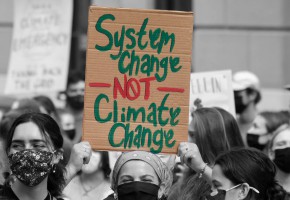
Poor adaptation and mitigation financing exacerbate losses and damages - Let's set the path
Hala Murad
Poor adaptation and mitigation financing exacerbate losses and damages - Let's set the path - Hala Murad
Unfortunately, the outcome of the last Conference of the Parties (COP), held in Sharm El-Sheikh, was not significantly different from the previous COP held in Glasgow in 2021. However, a major development that drew attention: was the decision to establish a Loss and Damage Fund that aims to support the most vulnerable communities affected by climate change. The fund was discussed in detail at the conference, and a draft was presented. However, it was withdrawn within 24 hours and the case has been postponed until the next COP in Dubai later this year. This fund is not only considered one of the most sensitive and important issues on the agenda, but its establishment will also be closely watched by many in the global community, especially the most vulnerable and fragile societies. Mentioning the most vulnerable societies leads us to several questions about the fate of the Arab region concerning the Loss and Damage Fund and the requirements sought from the Arab region.
The fate of the Arab region in terms of losses and damages
Climate change imposes severe threats to the Middle East, North Africa, and the Mediterranean basin, as it is one of the world's most water-scarce regions. Due to higher temperatures and lower precipitations, the region suffers from more frequent heat waves, droughts, and forest fires of unprecedented intensity. According to the Intergovernmental Panel on Climate Change estimates in its sixth report, the Arab region may face dire conditions compared to other regions in the world. The recurrence of forest fires in the region will be critical, as what happened last summer in Algeria, Tunisia, Turkey, and Greece might extend to Lebanon and Tunisia due to droughts and heat waves. That may incur material and moral losses to nature and humans that exceed their ability to bear the consequences without the presence of compensatory material interventions based on a Losses and damages fund. Today, the global civil and human rights society is making huge efforts to propose mechanisms that consider the priorities of the most vulnerable and affected communities. As an Arab Civil Society, we are required to work for our region to register and monitor areas of material and non-material losses and damages. In addition to being strongly present to defend Arab human rights with compensation for the losses and damages that resulted and will result from imminent climate changes. Approximately 6% of the world's population lives within the Arab region. However, it has less than 1% of the greatly threatened water resources by climate change, of which drought will be one of its most important manifestations, which has already begun. Since 1998, the region has witnessed frequent droughts. The question that remains in the scope of work is how we judge this drought as a result of climate change and the rise in the Earth’s average temperature, which reached 1.1 degrees Celsius above its post-industrial levels. Thus, we consider drought among issues that must be tackled and compensated for by the Loss and Damage Fund. Drought results in the loss of agricultural lands and livestock and poses a threat to Arab food security, as well as the loss related to the availability of healthy, safe, and clean water for direct human consumption, which affects human health and well-being. On the other hand, the region has had bad experiences with access to financing related to adaptation and mitigation. In advance, this may affect the possibility of accessing funds from the new fund.
Why should we worry and act?
Going back to the fifteenth edition of the Conference of the Parties (COP) in Copenhagen in 2009, where an agreement was reached insisting on wealthy countries’ commitment to donate an amount of $ 100 billion annually to poorer countries until 2020 to help them adapt to climate change, but what happened was much further than that. The pledged support from countries did not cumulatively exceed 70 billion dollars until 2020, and it is most likely that these funds were not in form of grants. Grants consist of only about 25 billion dollars, according to OXFAM’s International report last year, and the rest was debts. This gloomy scene casts a shadow over the Arab situation, as the total funding of the Green Climate Fund received by the Arab region between 2016-2020 reached only $90 million annually for projects at the country level in the area. The Green Climate Fund is committed to financing less than two national projects on average in the Arab region annually. Considering the amount of funding required for 11 Arab countries only to implement their nationally determined contributions, the number is approximately 570 billion, according to the estimated costs submitted by the countries, and therefore the total funding received in the period 2010-2020 to implement the main climate goals did not exceed 34 billion dollars, and it remains to be said that the flow of financing to the region is lacking balance in the distribution of funds across Arab countries, as 92% of the flows during the period 2010-2020 went to only six countries: Egypt, Iraq, Jordan, Lebanon, Morocco, and Tunisia. Egypt and Morocco have been most successful in identifying costs and mobilizing climate financing to meet their needs, receiving more than 60 percent of the region's $21.6 billion flows over the same period.
All of the above leads us to the fact that we need more work and focus on issues related to the region’s priorities and integratively work at the governmental level in the Arab region, as well as at the studies and research centers level and in partnership with civil society institutions to attract more financing based on need, which must be focused on the areas of adaptation to climate change and compensation for losses and damages. Despite their scarcity, previous funds were directed at rates up to three times higher for mitigation compared to adaptation. If we add the losses and damages issue, it is likely that - within the modest efforts of the Arab countries- the compensation quotas will be as low as possible.
All of the above does not consider what might happen by ignoring the Arab region within the structure of the Loss and Damage Fund. As mentioned before, the first withdrawn draft in Sharm El-Sheikh avoided placing the West Asia region (which includes the "Fertile Crescent" region, the Levant, and Iraq) within the general structure and only referred to Africa as a continent to include the North African region, and this also requires great efforts and attention in the upcoming negotiations.
Hala Murad
Recent publications

Thematic Report: Exploiting Resources, Ignoring Rights: A Political Ecology of Water and Energy in the Arab World
Related publications

An Alternative progressive cycle and a revitalized multilateral system - Roberto Bissio

